|
Printables |
PowerPoints |
Online exercises |
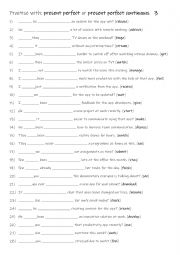
|
A2+-B1 Practise with present perfect or present perfect continuous 3
First Students familiarise themselves with the 2 tenses and their use. Then they read the sentences to work out which one is needed to complete the gap-fill using the infinitive in (). Each tense is used 14 times! Answers on page 2
Level: elementary
Age: 9-100
Type:
Downloads: 113
|
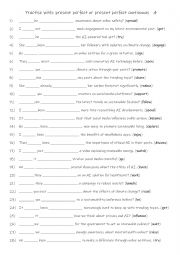
|
A2+-B1 Practise with present perfect or present perfect continuous 4
First Students familiarise themselves with the 2 tenses and their use. Then they read the sentences to work out which one is needed to complete the gap-fill using the infinitive in (). Each tense is used 14 times! Answers on page 2
Level: elementary
Age: 9-100
Type:
Downloads: 126
|
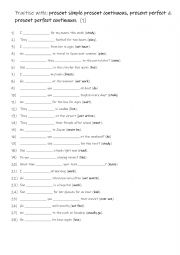
|
A2+-B1 Practise with present simple present continuous, present perfect & present perfect continuous (1)
Learning and practicing the Present Simple, Present Continuous, Present Perfect, and Present Perfect Continuous tenses is essential for clear communication in English. These tenses help students to express actions and events in different time frames�whether they are habitual, happening now, or linked to the past. Mastering these tenses improves acc...
Level: intermediate
Age: 8-100
Type:
Downloads: 105
|
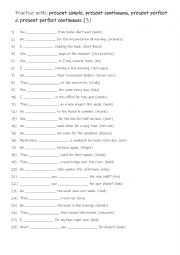
|
A2+-B1 Practise with present simple present continuous, present perfect & present perfect continuous (3)
Learning and practicing the Present Simple, Present Continuous, Present Perfect, and Present Perfect Continuous tenses is essential for clear communication in English. These tenses help students to express actions and events in different time frames�whether they are habitual, happening now, or linked to the past. Mastering these tenses improves acc...
Level: intermediate
Age: 9-100
Type:
Downloads: 112
|
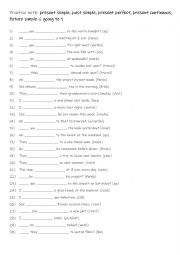
|
A2+-B1 Practise with present simple, past simple, present perfect, present continuous, future simple & going to 1
Learning the present simple, past simple, present perfect, present continuous, future simple, and "going to" is crucial because they are the most commonly used tenses for everyday communication. Each tense allows speakers to express actions and ideas clearly across different time frames. The present simple is used for routines and facts (I work eve...
Level: intermediate
Age: 9-100
Type:
Downloads: 105
|
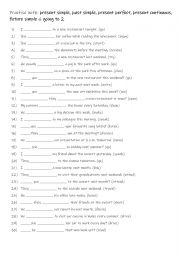
|
A2+-B1 Practise with present simple, past simple, present perfect, present continuous, future simple & going to 2
Practising these tenses allows students to speak confidently about everyday situations, past events, future plans, and hypothetical scenarios. It improves their ability to communicate with precision, enhances fluency, and prepares them for more advanced grammar. Mastery of these structures supports clearer expression of ideas and better understandi...
Level: intermediate
Age: 9-100
Type:
Downloads: 104
|
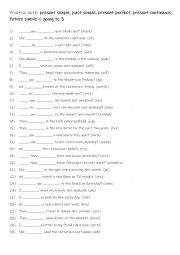
|
A2+-B1 Practise with present simple, past simple, present perfect, present continuous, future simple & going to 3
Mastering these tenses allows students to describe habits, routines, actions in progress, past events, completed actions, future plans, and intentions. By using them correctly, students can effectively communicate in various real-life situations, such as talking about daily activities, telling stories, making predictions, and expressing plans or de...
Level: elementary
Age: 9-100
Type:
Downloads: 142
|
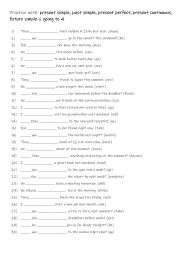
|
A2+-B1 Practise with present simple, past simple, present perfect, present continuous, future simple & going to 4
First, students need to familiarise themselves with the tenses and use. Then they read the sentences to work out which one is needed to complete the gap-fill using the infinitive in (). Each tense is used 3 times! Answers on page 2
Level: elementary
Age: 7-100
Type: worksheet
Downloads: 140
|
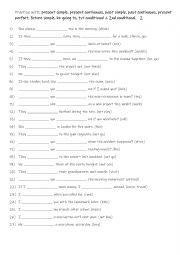
|
A2+-B1 Practise with present simple, present continuous, past simple, past continuous, present perfect, future simple, be going to, 1st conditional & 2nd conditional. 2
Practising these tenses allows students to speak confidently about everyday situations, past events, future plans, and hypothetical scenarios. It improves their ability to communicate with precision, enhances fluency, and prepares them for more advanced grammar. Mastery of these structures supports clearer expression of ideas and better understandi...
Level: intermediate
Age: 10-100
Type:
Downloads: 111
|
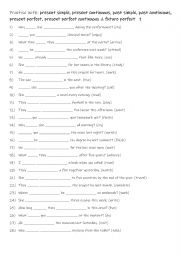
|
A2+-B1 Practise with present simple, present continuous, past simple, past continuous, present perfect, present perfect continuous & future perfect 1
Learning key tenses such as the present simple, present continuous, past simple, past continuous, present perfect simple, and present perfect continuous enables students to communicate clearly by expressing actions and events with accuracy. These tenses cover a wide range of contexts, from daily routines and ongoing activities to completed actions ...
Level: intermediate
Age: 9-100
Type:
Downloads: 120
|
|
|
|
|












